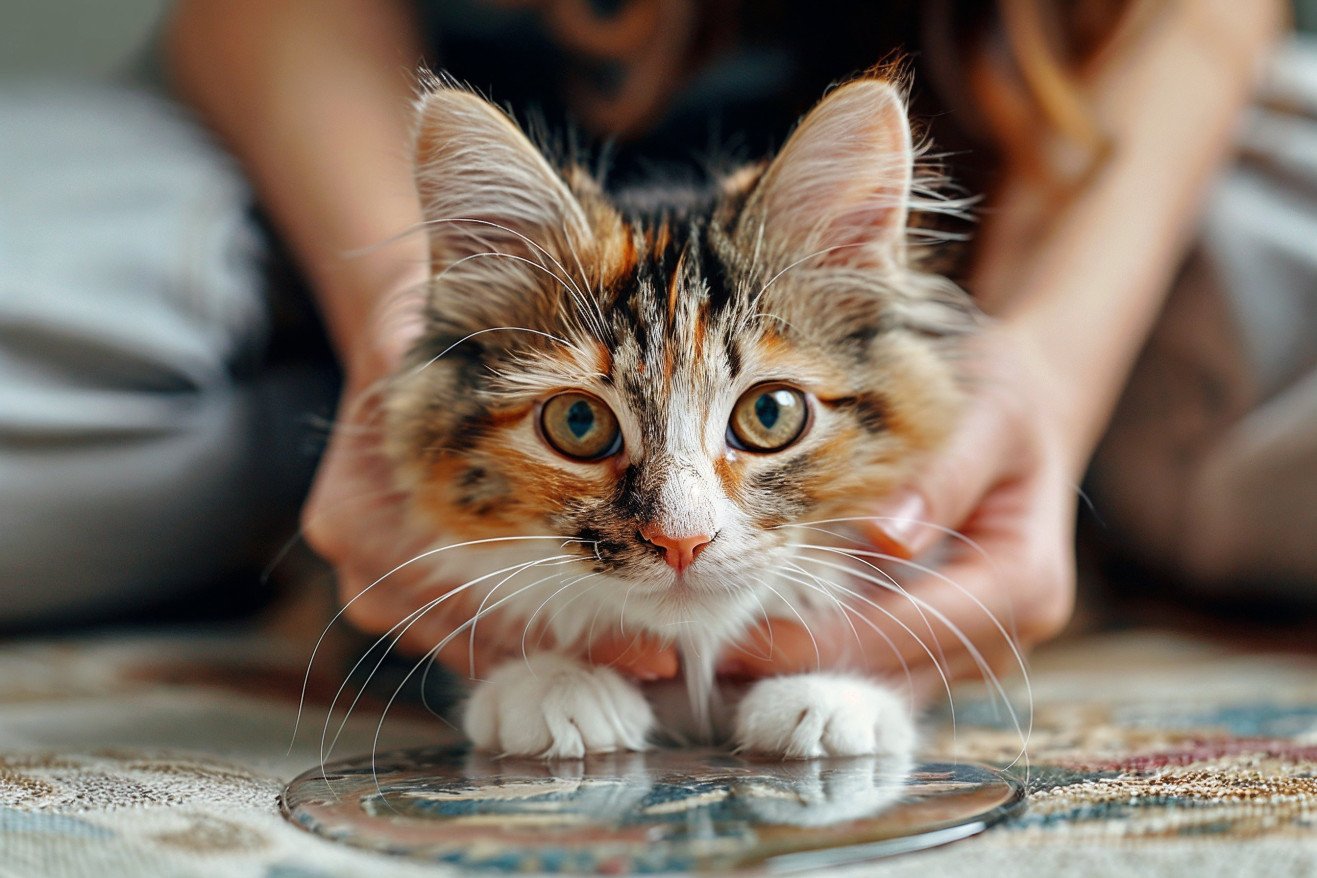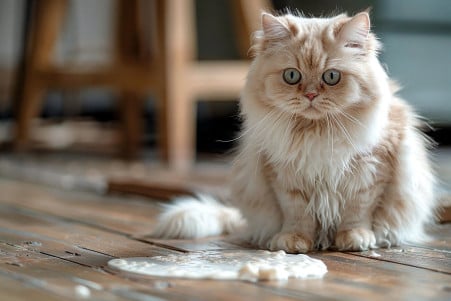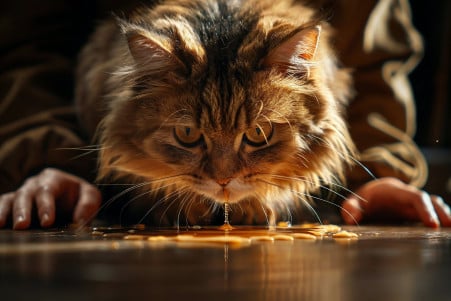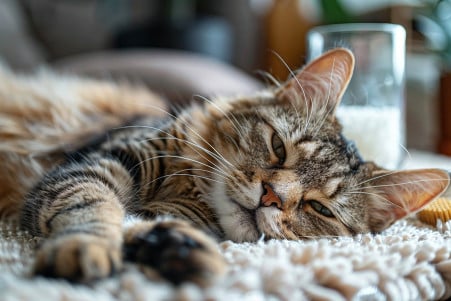Why Is My Cat Vomiting Clear Liquid? Causes and When to Worry
12 March 2024 • Updated 11 March 2024

If you’ve noticed your cat vomiting clear liquid, you’re likely concerned and wondering what could be causing this. The reasons a cat may vomit clear liquid range from hairballs to dietary indiscretions to gastrointestinal problems. If it happens once, you can watch and wait; however, if it continues, it may be a sign of an underlying issue that needs to be addressed by a vet to avoid dehydration and get to the root cause.
This article takes an evidence-based approach to explaining the causes of a cat vomiting clear liquid. It is informed by research in the fields of feline medicine and animal nutrition. It breaks down the causes of a cat’s digestive upset using information from clinical studies and expert advice in the field of feline veterinary care.
Knowing the signs and conditions that go along with it will help you better understand how serious your cat’s situation may be and when you should call the vet.
Why is my cat vomiting clear liquid?
Getting to the Bottom of Why Your Cat Is Vomiting Clear Liquid
The causes of clear liquid cat vomit can range from relatively harmless to serious health issues. When hair that a cat has ingested while grooming builds up in the stomach, it can lead to the cat vomiting hairballs, which is very common.
Purina explains that while the occasional hairball is nothing to worry about, if your cat is vomiting hairballs frequently, you should take them to the vet. To help prevent cats from vomiting due to dietary changes or sensitivities, experts recommend slowly transitioning them to new foods.
Bradenton Veterinary Emergency also recommends using food puzzles to help prevent cats from vomiting due to eating too quickly.
More serious conditions like kidney disease or cancer can also cause cats to vomit clear liquid, which is why it’s so important to make sure that your cat gets a thorough checkup from a vet. The difficulty of determining the cause of this symptom is further complicated by the fact that stress and anxiety, which can impact a cat’s physical and emotional well-being, can lead to vomiting.
Cats may vomit due to internal blockages, parasites, or ingesting toxic substances. Recognizing the role that these factors play in causing vomiting is important so that you can make sure that your cat gets the medical attention they need in a timely manner, as these factors can have serious health consequences.
Determining the Underlying Causes of Cat Vomiting
When a cat is vomiting clear liquid, veterinarians will first take a detailed history and perform a physical exam. A paper on PubMed stresses the importance of determining whether a cat is vomiting, regurgitating, or experiencing dysphagia during the initial exam. This is important because it will affect the diagnostic tests and treatment options that follow.
Veterinary Information Network (VIN) specialists, like Dr. Susan Little, list a number of diagnostic tests that may be used, including complete blood counts, serum chemistries, urinalysis, and fecal exams.
In addition, veterinarians will use imaging tests like X-rays or ultrasound, and sometimes endoscopy, to look at the inside of the body and take biopsies. These tests are important not only for finding gastrointestinal issues but also for finding systemic diseases, like renal disease or hyperthyroidism, that can cause vomiting.
Early detection and a methodical diagnostic process are important for managing cat health issues effectively. Today’s Veterinary Practice explains that the information gathered from these tests is important for creating a personalized treatment plan. Getting a diagnosis quickly and accurately can make a big difference in the health and happiness of our cats.
Stress and How It Affects Vomiting
The relationship between stress and vomiting in cats is a complex one. According to International Cat Care, chronic stress can lead to stress-related diseases and behavioral problems, which can result in vomiting. This is a physical response to the body’s inability to manage long-term stress.
Stress in cats can be caused by changes in their environment, such as the addition of a new pet or moving, or changes in their routine, and can lead to a variety of health issues, including digestive problems that result in vomiting clear liquid.
Blue Cross explains that the signs of stress in cats can be hard to spot and may include changes in behavior like hiding, changes in appetite, or increased vocalization. These signs can eventually lead to physical symptoms like vomiting.
To help reduce stress in your cat, make sure they have a calm environment. Madison Street Animal Hospital recommends keeping the litter box clean and creating safe spaces, especially during stressful events like construction or parties.
A stable and stimulating environment will help your cat feel safe, which is important for their mental and physical well-being. Fun toys, a regular schedule, and a safe space can help protect your cat from the negative effects of stress, which may help reduce the frequency of vomiting clear liquid and improve their quality of life.
The Vomiting and Dehydration Cycle in Cats
Dehydration can be a result of or a cause of vomiting in cats. Vomiting can lead to dehydration, as cats lose not only water but also essential electrolytes, which can lead to severe dehydration.
Signs of dehydration to look out for include a dry mouth, sunken eyes, lethargy, and poor skin elasticity, according to Wag. These signs are a warning that your cat is in a compromised state of health and needs to be seen by a vet.
WebMD warns that dehydration can make the situation worse, leading to more vomiting and creating a cycle of health issues. The relationship between water consumption and a cat’s diet is important, and a study published in PMC found that cats fed a diet of wet food, which is higher in moisture, had a lower risk of dehydration than those fed a diet of dry food.
Dehydration is usually treated with fluid therapy, which is often given intravenously or subcutaneously. Dehydration can be prevented by making sure cats always have access to fresh water and by feeding them a diet that includes wet food. Owners can also encourage their cats to drink more water by using pet water fountains and adding ice cubes to their water bowl, which can help ensure that they stay properly hydrated and healthy.
By making sure that we prioritize our cats’ hydration, stay aware, and take preventive measures, we can help ensure that our feline friends stay healthy and reduce the risks associated with vomiting clear liquid.
Summary of Cat Vomiting: What It Means and What to Do
Causes of vomiting clear liquid in cats can be as simple as hairballs and dietary issues or as complex as kidney disease and stress. That’s why it’s important to pay attention to your cat’s symptoms and get them to the vet if they’re vomiting regularly. Regular vomiting is a sign that your cat needs professional help.
Vets will use bloodwork and imaging to diagnose the cause of your cat’s vomiting, and this will help them determine the best course of treatment. It’s also important to know the difference between vomiting and regurgitation and coughing, as this will help you and your vet determine the cause of your cat’s symptoms.
It’s important to keep your cat’s environment as stress-free as possible and to make sure they’re well-hydrated. Stress-related vomiting and dehydration are both serious issues and can be both causes and effects of vomiting.
In short, cats are good at letting us know when something’s wrong, but their signs can be subtle. By paying attention to your cat’s symptoms and getting them help when they need it, you can make sure that they live a long, healthy, and happy life. It’s up to us to recognize their symptoms and give them the care they need.


